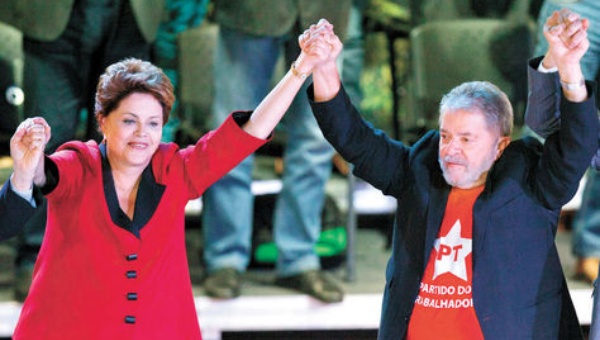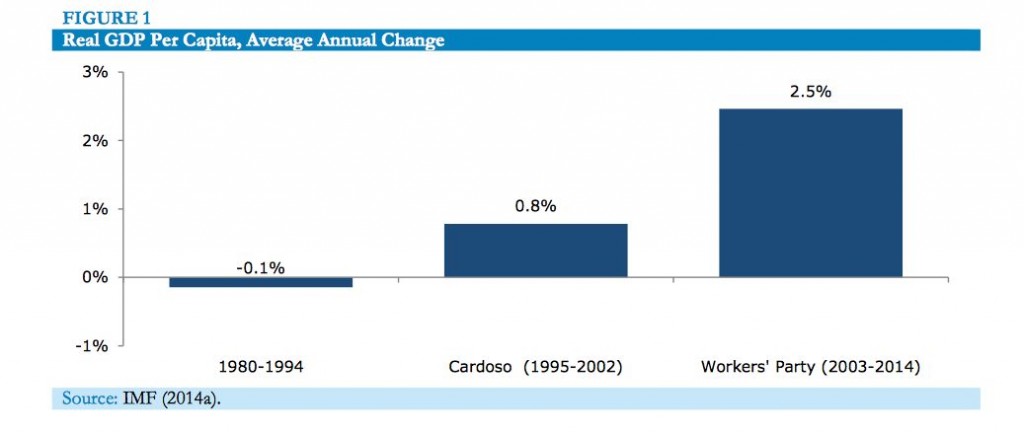
Social policy, economic changes transformed Brazil
WASHINGTON, DC – The Center for Economic and Policy Research (CEPR) released a research paper that looks at social and economic indicators, as well as policy changes that have occurred since 2003 in Brazil.
“The lives of tens of millions of Brazilians have been transformed by the economic and social policy changes of the past decade,” said CEPR Co-Director Mark Weisbrot, lead author of the paper. “A sharp increase in economic growth, combined with increased social spending, large increases in the real minimum wage, and increased bargaining power for labor allowed for greatly reduced poverty and unemployment, as well as declining inequality.”
“These changes appear to be durable, having mostly withstood the world recession and the slowdown in worldwide economic and trade growth of the past few years.”
Among the paper’s findings:
- Since the Workers’ Party (PT) won the presidency with Lula da Silva taking office in 2003, poverty has been reduced by over 55 percent, from 35.8 percent of the population to 15.9 percent in 2012. Extreme poverty has been reduced by 65 percent, from 15.2 percent to 5.3 percent over the same time period. Over the last decade, 31.5 million Brazilians were lifted out of poverty and, of that number, over 16 million out of extreme poverty.
![GDP]() GDP per person grew at a rate of 2.5 percent annually from 2003-2014, more than three times faster than the 0.8 percent annual growth of the prior government (1995-2002). This was in spite of the 2008-09 world financial crisis and recession, which pushed Brazil into recession in 2009; and also including the slowdown of the past few years.
GDP per person grew at a rate of 2.5 percent annually from 2003-2014, more than three times faster than the 0.8 percent annual growth of the prior government (1995-2002). This was in spite of the 2008-09 world financial crisis and recession, which pushed Brazil into recession in 2009; and also including the slowdown of the past few years.- While inequality remains high, there were large changes in how the gains from economic growth were distributed as compared with the prior decade. For example, the top 10 percent of households received more than half of all income gains from 1993-2002, but this fell to about one-third for 2003-2012.
- Social spending has consistently increased since 2003, rising from 13 percent of GDP to over 16 percent in 2011, the last year for which data is available. Education spending has increased from 4.6 percent of GDP in 2003 to 6.1 percent of GDP in 2011.
- Unemployment has decreased from 13.0 percent in 2003 to an average of 4.9 percent in the first quarter of 2014, a historic low.
The paper finds that these results were achieved due to policy choices, including often counter-cyclical fiscal and monetary policy, a reactivated industrial policy, lowered domestic interest rates and a break with IMF conditionalities following Brazil’s paying off its IMF debt early, in 2005. Economic stimulus helped Brazil rebound strongly from the 2008-2009 global recession. The government has raised the real (inflation-adjusted) minimum wage by 84 percent; this boosted pensions and public sector wages that are tied to it, as well as other wages and salaries.
Programs such as Bolsa Familia (BF) helped bring down poverty; since 2003, expenditures on the program in real (inflation-adjusted) Reais increased from 4.8 billion to 20.7 billion (0.2 percent of GDP to 0.5 percent of GDP). From 2003 to 2012 the number of individuals covered by Bolsa Familia increased from 16.2 million to 57.8 million. As a percent of the population, coverage increased from below 9 percent in 2003 to nearly 29 percent in 2012.
The PT government has aided the country’s industrial sector in part through the national development bank BNDES. Disbursements from BNDES have increased from 2.2 percent of GDP in 2005 to nearly 4 percent in 2013, with priority sectors for Brazil’s industrial policy receiving about 80 percent of BNDES disbursements between 2006 and 2012.
In the last few years the economy has slowed, although unemployment has continued to decline, and average wages have risen. The paper faults overly-tight and sometimes pro-cyclical macroeconomic policies, including monetary and fiscal policy, since 2011, for the economic slowdown; as well as the slowdown in world economic and trade growth.
[Photo above of Dilma Rousseff and Lula da Silva who have presided over the Brazilian transformation since 2003.]



